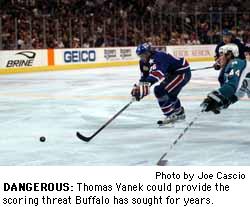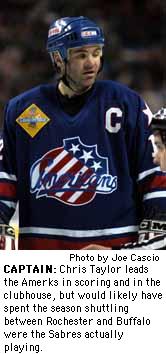
While some established hockey players have found bell work to keep busy during this lost National Hockey League season, including taking jobs of players in Europe, those players on the cusp of permanent employment status have had to pay their dues a little bit longer in the American Hockey League.
The quality of hockey in the top minor league in North America is up tremendously, even though the trade-off has been becoming the NHL's guinea pig for implementing concepts whose purpose is trying to attract more fans to watch a game that will never be television-friendly -- no matter what color they paint the ice.

But this piece isn't about the state of a game that will have a tough time winning back many of the fans it once had when the lockout is settled. Nor is it about owners and players who believe meeting to negotiate in different cities is something that needs to be planned in advance, like a vacation, instead of just staying in one city and not leaving until the conflict is resolved.
It's about Derek Roy, Thomas Vanek, Ryan Miller, Jeff Jillson and Rory Fitzpatrick -- now members of the Rochester Americans. They would have spent March and April trying to help the Buffalo Sabres make their annual desperate push to end a postseason drought that dates back to 2001. If there had been a season.
A few others, like Chris Taylor, Paul Gaustad and Milan Bartovic, may also have had an impact in Buffalo, or at least gotten a shot with the Sabres. Instead, they're gearing up for a playoff run with the best team in the AHL.
Here's a look at what the five should-have-been Sabres have done in Rochester, and what they might have accomplished for Buffalo:
Derek Roy, center, 15 goals, 58 points: Roy amassed nine goals and 19 points in 49 games with the Sabres last year. Including regular and postseason stats with the Sabres and Amerks, he had 25 goals and 59 points in 91 games.
Stats aside, what is most impressive about the 5-foot-8, 188-pounder's game is the grit and determination he plays with despite his small stature. A lack of grit and determination (and a goalie of Dominik Hasek's caliber) are among the reasons the Sabres are mired in the longest postseason drought in franchise history.
The club's second-round selection in the 2001 NHL Entry Draft played his best hockey during the final two months of the 2003-04 season during the Sabres' failed attempt at sneaking into the playoffs. He scored two of his four game-winning goals in late March before the Sabres extended his season by optioning him to Rochester for the Calder Cup playoffs, where he helped the Americans reach the semifinals by tallying six goals and 14 points in 16 games.
That wasn't surprising, since Roy earned a reputation for being clutch in playoff situations at the junior level. Roy captained the Ontario Hockey League's Kitchener Rangers to the Memorial Cup (Canadian junior hockey's version of the Stanley Cup) in 2003 and earned the tournament's Most Valuable Player honor.
Given his potential and the fact he played well during his time with the Sabres, Roy most likely would have made center Tim Connolly -- who's soft as Charmin -- expendable. In fairness to Connolly, he did miss all of last season with post-concussion syndrome, but missing a year and his penchant for trying to be too fancy with the puck and ultimately doing nothing with it, coupled with the grit and leadership of fourth-line center Adam Mair, would have led to his displacement in the lineup.
Roy has had five stretches in which he's picked up at least one point in a minimum of four straight games, including a season-high seven-game point streak that has been in hiatus since March 19 because of a concussion. Roy may have been able to pop in 15 goals as the Sabres' third-line center, which is pretty good in this day and age of watered-down NHL hockey -- when the NHL plays hockey, that is.

Thomas Vanek, left wing, 32 goals (18 on the power play), 56 points: The fifth overall pick of the 2003 NHL Draft got off to a slow start while adjusting to the clutching and grabbing of the pro game, which is why he would have started the season with a steady diet of minor-league bus rides. His early indifference to defense also would have kept him down on the farm -- but only momentarily. He was drafted to light the lamp, something he's done often with the Americans. Since the Sabres have struggled to score goals for almost 10 years, he would have had to wait until Christmas at the latest to get called up.
Scoring in the AHL doesn't necessarily translate to instant success in the NHL, but the Sabres don't have a lot at left wing. Given Vanek's track record for piling up goals and assists at the University of Minnesota (57 goals and 113 points in 83 games) and in his final season of junior hockey in Sioux Falls (46 goals and 91 points in 53 games), he would have been relegated to the third line, at worst.
He has the rare combination of size, speed and scoring touch that strikes fear in the opposition -- something the Sabres haven't really had in any one player since Gilbert Perreault -- and would have provided a boost on the power play.
Jeff Jillson, defenseman, 10 goals, 26 points: Jillson is young and prone to making mistakes at the wrong time, something he did a lot of after being acquired at the trade deadline from the Boston Bruins last season. But the former Michigan Wolverine has the size and skating ability to succeed so long as he stops making bone-headed plays. He leads Americans defensemen in scoring and is a plus-6.
The Sabres lived and died with his mistakes last year as injuries to Alexei Zhitnik and Rory Fitzpatrick severely weakened the unit. Still, he's a better playing option than Brian Campbell, who immediately coughs up the puck whenever he's about to get crunched by the opposition. Jillson makes the defensive unit better, which improves playoff chances.
Ryan Miller, goalie, 38-15-4-8, 2.32 goals-against Average, .926 save percentage, eight shutouts: Miller would have been the "X" factor because he most likely would have been starting for the Sabres had the lockout ended in January or February. With the club needing to make the playoffs in a short season, he would have been a better option as No. 1 because incumbent Marty Biron is a chronic slow starter, a trait that's helped kill playoff chances during standard regular seasons. Backup Mika Noronen piles up solid stats but is maddeningly erratic in the clutch. Miller leads the AHL in wins and shutouts. Even more encouraging is he's mentally tougher this year, the key to succeeding in the NHL. He's bounced back from the occasional bad outing by stringing together outstanding games.
The lockout may have been a blessing in disguise for Miller and the Sabres because this is the first time in Miller's professional career he didn't have to concern himself with his standing in the organization. All he's had to do is stop pucks, which should be proof enough to him that if he just worries about that, everything will take care of itself.
Rory Fitzpatrick, defenseman, one goal, 11 games: He signed with the Amerks in early March and most certainly would have been on the Sabres after proving he's more than an organizational depth player last season by playing well when given the ice time.
He's not flashy and has his limitations, but makes up for it with smarts and was receiving between 20 and 30 minutes of ice time in Rochester before a knee injury ended his season with 17 games left.
| Niagara Falls Reporter | www.niagarafallsreporter.com | April 5 2005 |